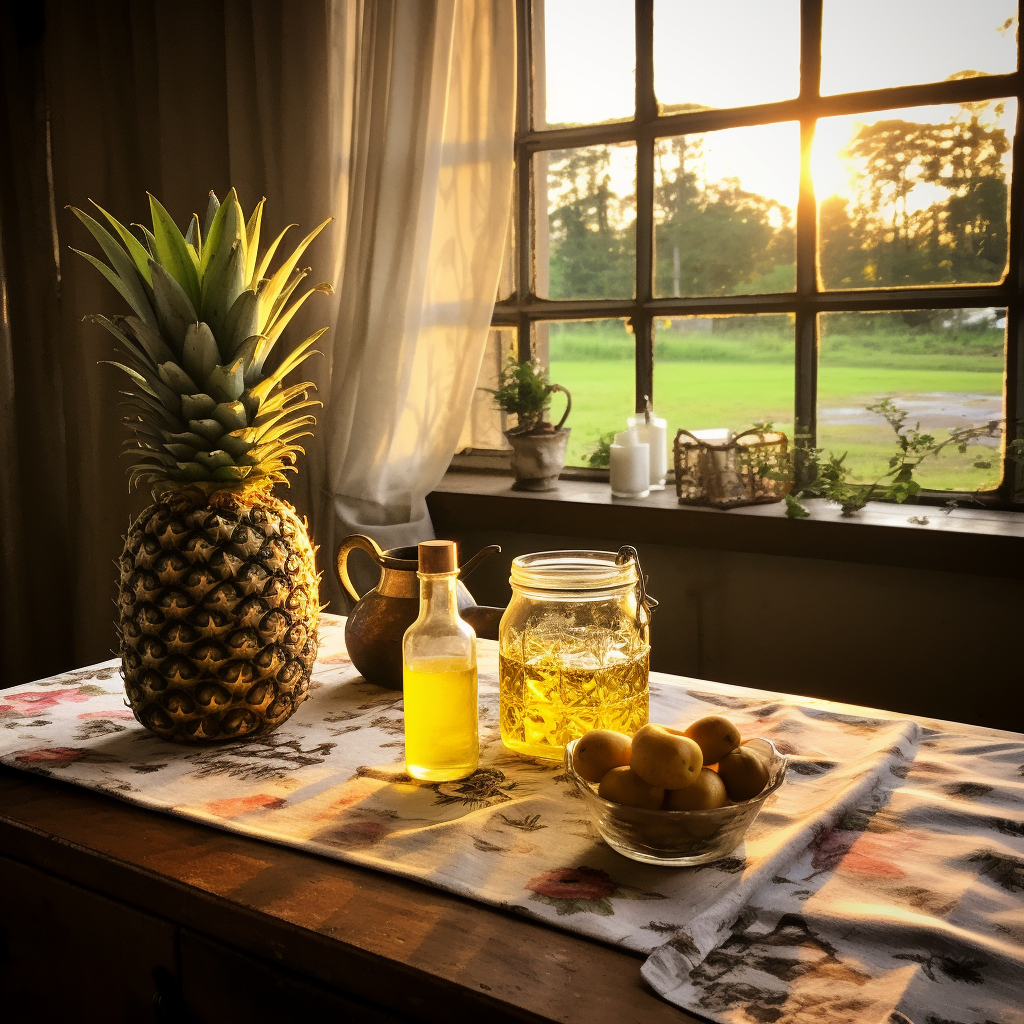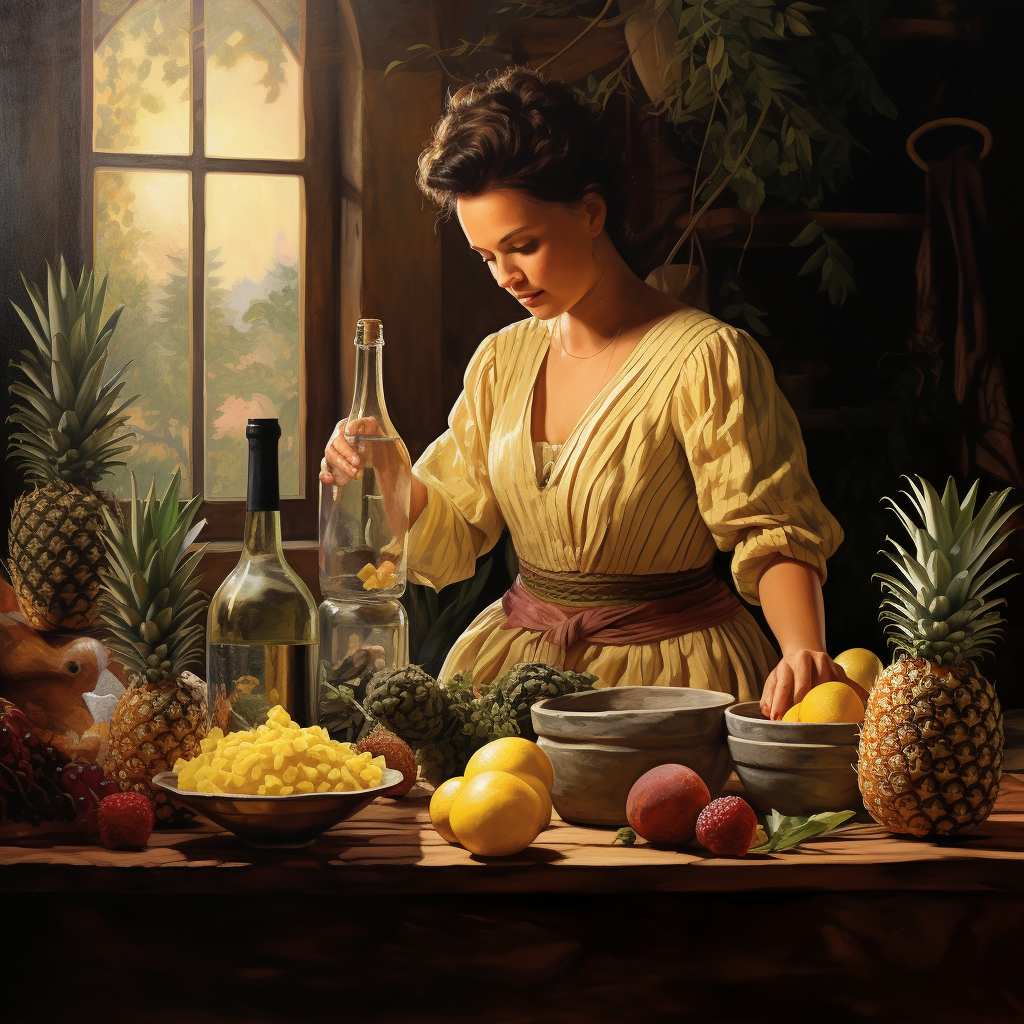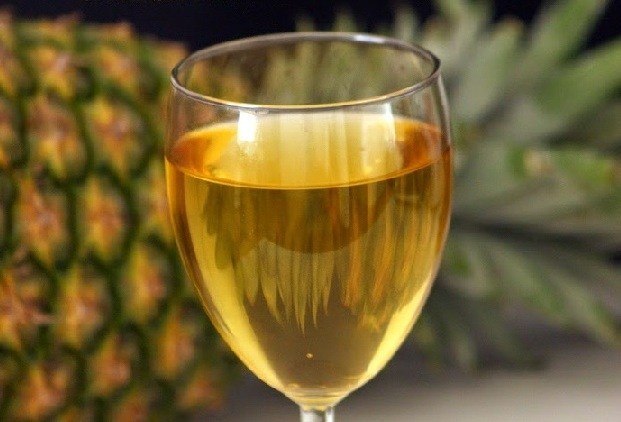
Introduction
When the sun is shining and the days are long, there isn't any better way to enjoy the good weather than whipping up some of your favorite drinks. Pineapple wine is a fantastic way to cool off on a hot day. It has a sweet taste with exciting tropical flavors, and it's perfect for summer getaways or family gatherings. Moreover, it is even used on Easter or Christmas.
Pineapple is a golden option to make wine, especially if you are a beginner! There are a lot of pineapple varieties around the world, and that makes this recipe so special and different in each country.
When making pineapple wine, you'll need a couple of additional ingredients. First, you'll need sugar, if your pineapple wine is all fruit. You might also add a secondary fermentation component, which brings out more flavor. These additional ingredients, such as cane sugar or brown sugar, will bring out different characteristics of your pineapple wine. For example, a dark fruit flavor or a sweeter flavor.

When it comes time to taste your pineapple wine, don't be afraid to change the recipe as you see fit. Adding some additional fruits or blending wine from pineapple with other fruit juices can give it entirely new dimensions. But it's not necessary. The important part is to have fun and try new things, letting your creativity shine through.
How to Make Pineapple Wine
Equipment and Ingredients for Making Pineapple Wine at Home
Making wine from pineapple is much easier than most people think, and you don't need too many special tools for it. The necessary items to start your pineapple winemaking journey are few and include fresh pineapple, sugar, water, yeast, and, optionally, cloves or cinnamon for added flavor. Additionally, if you are keen on creating the perfect drink, you might want to invest in a special airlock, hydrometer, and a carboy.

General pineapple wine procedure
Step 1: Sourcing and Preparing the Pineapple
The first step is to peel the pineapple and remove the core. Cut the pineapple into small cubes, and combine it with enough boiling water to cover it. Mash the fruit using a potato masher or a fork, and allow it to cool before you add the sugar. Alternatively, you can use canned pineapple if fresh fruit is not available.
Step 2: Adding Fermentables and Yeast
Once the pineapple has cooled down, add the sugar and stir it to dissolve, before adding the yeast. Stir until everything has mixed before transferring it into the carboy, a special tool for wine and beer fermentation. Fill it up to two-thirds with all the ingredients.
Step 3: Fermenting and Storing the Wine
The fermentation process is the most exciting part of the winemaking process. Seal the carboy with a stopper and airlock, and move it to a dark place where the temperature won't go below 10°C and above 24°C. The longer you let it ferment, the better the flavor and the alcohol content will be. After six weeks, if the hydrometer shows 1.000 or less, it is time to bottle the wine.
Step 4: Enjoying the Wine
After bottling the wine, keep it in a dark place for two more months before you drink it. When the time comes to the occasion, enjoy it chilled or at room temperature. With this recipe, you will be able to make eleven liters of wine with an alcohol content of 11.5%.
Are you ready? can you make pineapple wine this season? We are excited to begin here at MakeWineLab.com

Ingredients
- Fresh Pineapples 3 kg 🍍🍍🍍
- Water 4 liters
- Raisins 1 tablespoon
- Tea 1 cup (seems strange to you? You'll see why)
- Juice of 2 limes
- Sugar 600g
- Brewing yeast 7g
Procedure
- Wash the fresh pineapples and remove the leaves of the crown, do not peel them since the skin has a lot of esters that release aroma and taste.
- Cut the pineapples into slices and cut them into small pieces. Then, put the pieces in a pot along with the remaining ingredients, the water, the juice of the limes, and the raisins.
- Boil this mixture for 15 minutes, stirring occasionally (Scientific data: the lime juice reduces the pH and helps the release of molecules from the pineapple at high temperature, the procedure is known as hydrolysis).
- When the 15 minutes have passed add the sugar and the glass of tea. Then let it boil for 5 more minutes to help dissolve the sugar (Secret: the tea improves the bright color and provides a tannin flavor)
- Cool the pot in a sink by placing it in contact with water until it reaches room temperature.
- Transfer the entire mixture containing the pineapple juice, including the pineapple chunks, to the fermenter. You can use a straining bag to introduce the chunks.
- Check the initial SG of the liquid and record this value.
- Add the wine yeast to generate the must, and close the fermenter. Install the airlock in the lid and let ferment for 5 days on average.
- When the primary fermentation finishes, transfer the liquid to a carboy and allow the secondary fermentation to occur for 7 days.
- Drain the wine to another carboy by using a siphon, and check the final SG to calculate the alcohol content (ABV).
- To clarify, let the wine rest for another week and drain the clarified part into your bottles using a siphon. You can follow the directions on the main page of this site.
- Enjoy!
Wine From Pineapple Recommendations
We received tons of questions weekly about how to make pineapple wine at home. This guide provides our best recipe, but also pay attention to the following recommendations to achieve success.
- Selecting Ingredients:
- Choose fully ripe pineapples (around 12-15 pounds) for optimal sweetness and flavor.
- Gather the remaining pineapple wine ingredients, including 10 cups of water, 2.5 pounds of sugar, 1 teaspoon of pectic enzyme, 1/2 teaspoon of yeast nutrient, fresh pineapple chunks (optional), potassium sorbate for stabilization, and the selected wine yeast.
- Preparation:
- Peel, core, and cut the ripe pineapples into small chunks using sanitized equipment.
- Sanitization:
- Ensure all equipment, including fermentation vessels, airlocks, and utensils, is thoroughly sanitized.
- Primary Fermentation (First 48 Hours):
- Mix pineapple chunks, sugar, and water in the fermentation vessel.
- Add 1 teaspoon of pectic enzyme and cover with an airtight lid fitted with an airlock. Allow it to sit for 48 hours.
- Secondary Fermentation (Next 24 Hours):
- Add 1/2 teaspoon of yeast nutrient. Optionally, include fresh pineapple chunks for enhanced flavor.
- Final Steps:
- Add the selected wine yeast to the mixture after the initial 48 hours.
- Fit the airlock and allow fermentation to complete.
- Add potassium sorbate to stabilize the wine.
- Bottle the wine after fermentation, leaving sediment behind.
- Aging:
- Age the bottled pineapple wine for at least a few months in a cool, dark place.
Final thoughts
🍍Making pineapple wine is an inexpensive and fun way to experience the winemaking process by yourself. With the help of this guide, where we introduce a recipe for pineapple wine, you can now make it at home without the need for any special equipment. Share it with friends and family and let us know what your favorite flavors are!
Frequently Asked Questions (FAQ)
1. How does pineapple wine taste?
Pineapple wine boasts a delightful tropical flavor profile, offering a perfect blend of sweetness and acidity. The result is a refreshing and crisp wine with distinct pineapple notes that dance on your palate.
2. Can you make alcohol out of pineapple?
Absolutely! Pineapples contain natural sugars that can be fermented by yeast, transforming those sugars into alcohol. This fermentation process is the key to creating pineapple wine, producing a delightful beverage with a moderate alcohol content.
3. How much alcohol is in pineapple wine?
The alcohol content in pineapple wine typically ranges between 10% and 14%, depending on factors such as the fermentation process and yeast used. Regular monitoring during fermentation helps achieve the desired alcohol level for your pineapple wine.
4. Is pineapple wine good for health?
In moderation, pineapple wine can offer some potential health benefits. Pineapples are rich in vitamins, enzymes, and antioxidants, which may contribute to overall well-being. However, it's essential to consume alcohol responsibly and be mindful of individual health considerations.





 Based on 4 Review(s)
Based on 4 Review(s)
